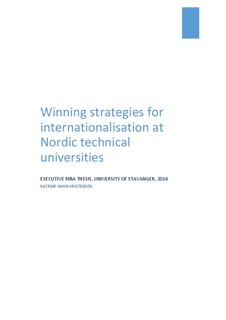| dc.contributor.author | Kristensen, Katrine Hahn | |
| dc.coverage.spatial | Norway, Sweden, Denmark, Finland, Iceland | nb_NO |
| dc.date.accessioned | 2016-10-11T13:31:05Z | |
| dc.date.available | 2016-10-11T13:31:05Z | |
| dc.date.issued | 2016-05 | |
| dc.identifier.uri | http://hdl.handle.net/11250/2414329 | |
| dc.description | Master's thesis in Executive MBA | nb_NO |
| dc.description.abstract | This study has investigated strategies for internationalisation at technical universities in the Nordic countries and explored why and how some universities are more successful with their strategies. Strategy is defined here as the long-term direction of an organisation, and internationalisation as the ongoing process of integrating an international perspective into the university system to respond and adapt appropriately to a changing external environment. The study investigated the institutional rationales for internationalisation, the stories told in the strategy documents, the importance of leaders, faculty, administration and students for implementation of the strategy and barriers and key components of successful internationalisation.
The strategic work with internationalisation was studied across 27 technical universities in Denmark, Finland, Iceland, Norway and Sweden. Information was gathered from written strategy documents from all 27 institutions; a questionnaire with replies from 15 institutions; and interviews with five leaders of international units during the period November 2015 to April 2016. The exploring strategy model (Johnson et al. 2014) was used as the basis for analysing and evaluating the three elements of strategy, their relations and relative importance.
The strategic work with internationalisation at Nordic technical universities reflects both global trends of competition and the traditional Nordic model of cooperation. Overall, the universities incorporated internationalisation in their strategies in order to increase quality in research and education and to establish strategic partnerships and networks. There is a shift in rationales from a more traditional approach of internationalisation to a new integrated form. The new motivation for internationalisation covers much more that traditional student- and staff mobility. Implementation was found to be very important for making a strategy successful. Concrete action plans can be helpful in order to implement the overall strategic aims. Clear communication and dialogue about the ambitions of internationalisation is important. Especially the top leaders were crucial to make the vision and goals clear all the way throughout the organisation. The institutional culture and identity was also found to be of large importance for implementation of strategic aims for internationalisation. | nb_NO |
| dc.language.iso | eng | nb_NO |
| dc.publisher | University of Stavanger, Norway | nb_NO |
| dc.relation.ispartofseries | Masteroppgave/UIS-SV-HH/2016; | |
| dc.subject | økonomi | nb_NO |
| dc.subject | administrasjon | nb_NO |
| dc.subject | internationalisation | nb_NO |
| dc.subject | strategy | nb_NO |
| dc.subject | university | nb_NO |
| dc.title | Winning strategies for internationalisation at Nordic technical universities | nb_NO |
| dc.type | Master thesis | nb_NO |
| dc.subject.nsi | VDP::Social science: 200::Economics: 210::Business: 213 | nb_NO |
